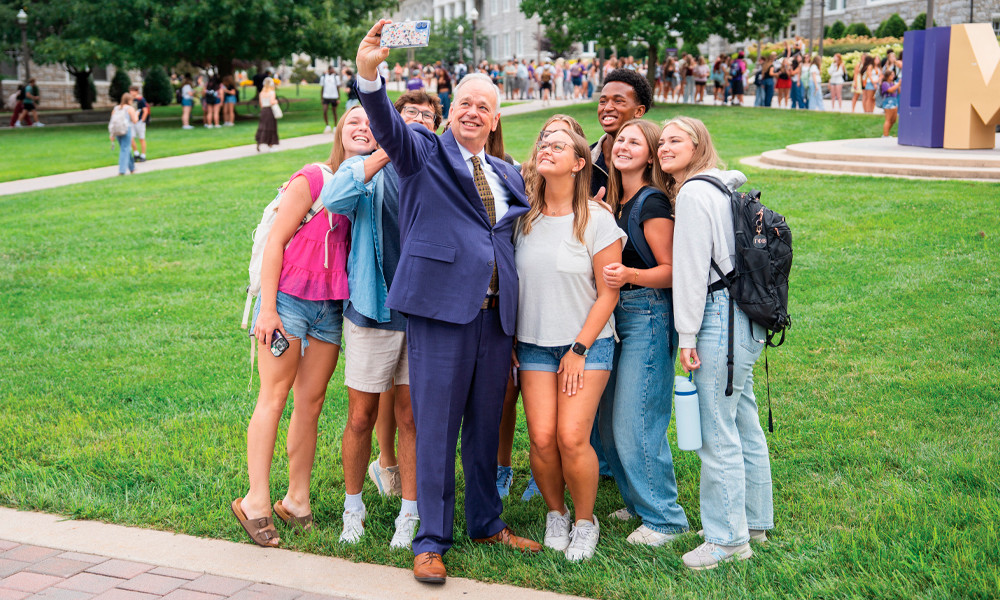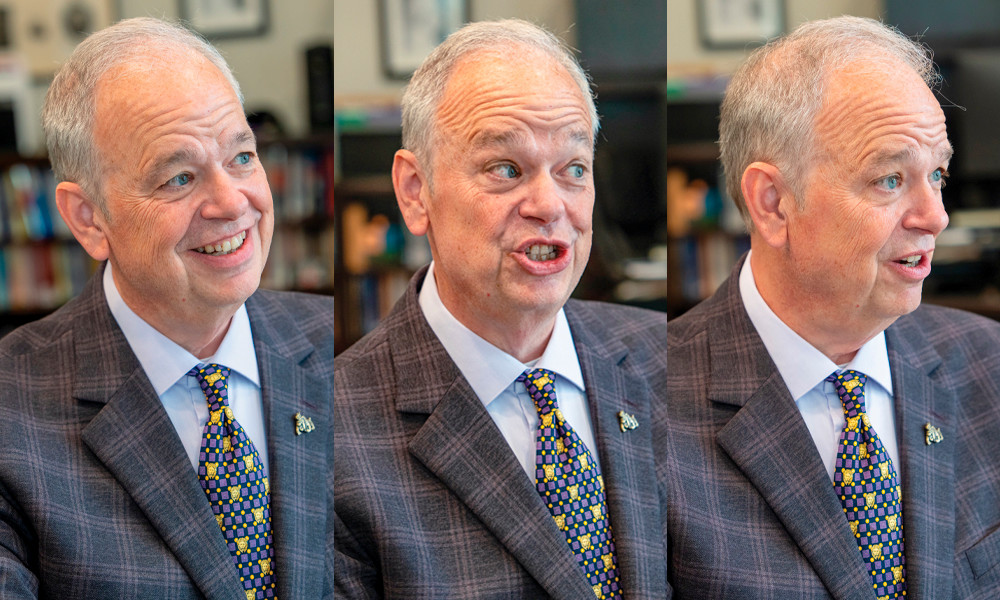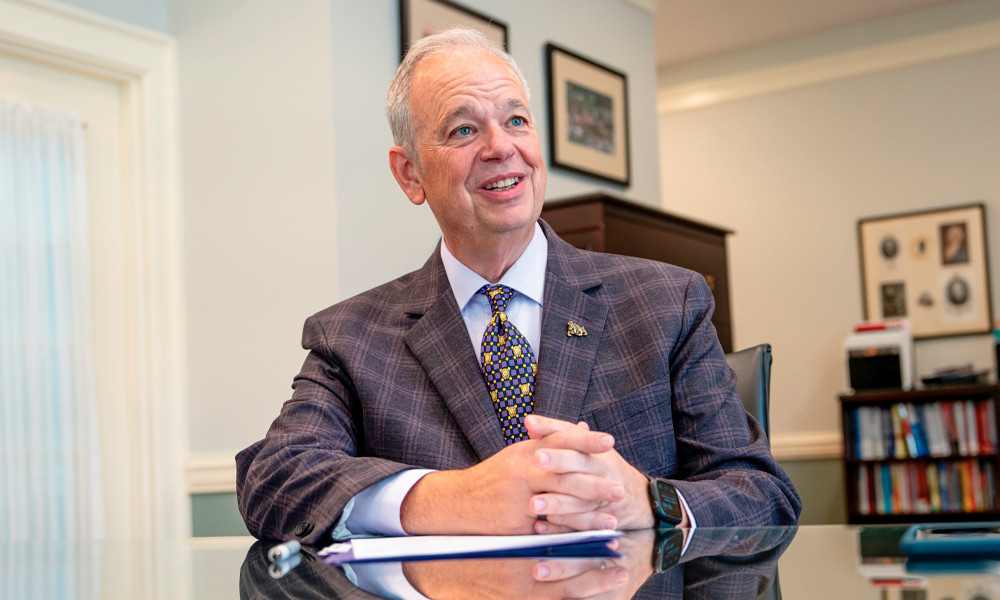Future-focused
President Jim brings bold, entrepreneurial leadership to JMU
Education
SUMMARY: In March, following a nationwide search, Dr. James C. Schmidt was announced as the seventh president of James Madison University. His tenure officially began July 1. Madison magazine recently caught up with Schmidt, aka President Jim, to discuss what drew him to JMU, his vision for the university and some of the challenges facing higher education.
Madison: You’re the first president of JMU to have led another university prior to coming here. Before you ever set foot on campus, what did you know about JMU, and what was it that made you want to apply?
President Jim Schmidt: I was a bit surprised to learn that I was the first person to serve in this role who had been a president before. Frankly, institutions of JMU’s stature often attract sitting presidents to apply. I can tell you, JMU was on my radar. I was working on my third strategic plan at the University of Wisconsin-Eau Claire, having served 12 years there. Eau Claire had accomplished a lot, and I was really pushing our campus to go to that next level. … When you’re going through that process, it’s helpful if you can point to peer institutions around the country that have had a similar journey to let your people know it’s possible [and] to get them to dream big enough to really accomplish that. As so, as we were developing our new strategic plan, I asked my vice chancellors to identify three or four other former teachers’ colleges around the country that had really risen to a new level. Not surprisingly, JMU was one of the schools that came back. And I’d heard colleagues and people around the country talking about JMU, so I was intrigued.
Madison: As a candidate, you visited campus as a “secret shopper.” What were some of your impressions of the university and some of your takeaways from that visit?
Schmidt: [During the search process] I was really excited about everything I had learned about JMU, and every interaction I had with the search committee left me more excited than before. But because it was a confidential search, we were never really going to be on campus. And for me, a sense of place is terribly important. I wanted a sense, not only of the physical campus, but more importantly, what was the culture? … And so, I told my wife, ‘I think I need to just jump on a plane and go see for myself.’ I spent about two and a half days in Harrisonburg. It was the third week of January, and there was snow on the ground, so I felt right at home.
What I experienced was, first, students who are very earnest and hardworking. They were studying all across campus. I went to D-Hall and overheard students talking about their experiences in a class or in a research project, or study abroad. I would go up to their tables and ask them, ‘Hey, I’m just curious. Would you mind telling me why you chose JMU? What do you love most about it? What do you hope to do when you leave?’ And I sat back, and I heard these amazing stories. And it was universal — not one person had a bad thing to say. And what was funny to me was, not one student asked me who I was or why I was asking these questions.
I visited the Forbes Center for the Performing Arts. I was in the [College of Business], the [College of Health and Behavioral Studies]. I didn’t get to every building on campus but enough to have a real sense of the place. I also wanted to see firsthand what it meant to have Dukes holding doors for one another. I wanted to know if that was just a marketing slogan or if it was a real thing. Turns out, it’s a genuine act of kindness. It blew me away.
I’ll never forget, I called my wife from the hotel room the first night, and I was a little bit out of my skin, I was so excited about the place. I told her, ‘I think this is it. I think this is the right fit for me.’

Madison: When you were at UW-Eau Claire, you were known as the “entrepreneurial chancellor,” and I understand you want to take that same approach here as president. What will having an “entrepreneurial president” mean for JMU?
Schmidt: It was actually former [Wisconsin] Gov. Tommy Thompson — who went on to become president of the University of Wisconsin System, and my boss for several years — who started introducing me that way: ‘This is the entrepreneurial chancellor of the University of Wisconsin-Eau Claire.’ … So what does it mean for JMU? It means that I’m constantly looking for opportunities. I’m looking for areas where the university’s interests and mission intersect with the private sector, the nonprofit sector and the Commonwealth [of Virginia] as a whole. I see those intersections and opportunities as having the potential to create value for everybody. … One of the chief jobs of the president of an institution is making sure that the faculty and staff have the resources necessary to provide an exceptional educational opportunity for students. … There are never going to be enough state funds and never enough tuition dollars to do all of that, so I’m looking for opportunities to bring other resources to the table, both financial and experiential. I’m also looking to see where we can partner with other organizations and make sure they’re coming out better for it as well. One of my goals is to be the preferred university partner for the commonwealth. I want businesses and nonprofits to say, ‘I wonder if there’s an opportunity to work with JMU.’
|
“I’m constantly looking for opportunities. I’m looking for areas where the university’s interests and mission intersect with the private sector, the nonprofit sector and the Commonwealth [of Virginia] as a whole. I see those intersections and opportunities as having the potential to create value for everybody.” |
Madison: Since you’ve been on the job, you’ve been crisscrossing the commonwealth, talking with business, government and community leaders, some of them JMU alumni. What have those conversations been like, and how will those relationships help our students?
Schmidt: One of the things I believe and have always used as a model is, you have to build relationships before you truly need them. It’s why I made time in my first week to reach out to the mayor of Harrisonburg, to the county administrator of Rockingham County and to shared governance leaders. That sends a message of where your priorities as president lie. And I want to set that expectation with businesses and alumni across the commonwealth, that we may be here in this beautiful Shenandoah Valley, but our impact is statewide and, frankly, global.
In my first four weeks on the job, I logged 3,000 miles on my car. … And what I heard from business leaders is, first of all, just great admiration for JMU. With major employers, I simply wanted to know, how are our graduates doing? And you know, I heard [favorable] comparisons with what might be considered more prestigious institutions across the country and certainly in the commonwealth as well. I discovered that some of the things that define a JMU graduate are strong communication skills, critical thinking skills and the ability to work constructively in teams. That’s huge. … The talent pipeline is terribly important too. So, how can we do better? I want to be known as the university that’s nimble, innovative, cost-conscious, entrepreneurial, responsive. I also want us to have that reputation of being a little scrappy and, again, entrepreneurial — willing to take a little bit of risk. Because that’s where great opportunities exist for students, and it means that we’re serving the public good as well.
Madison: As you know, fundraising is a critical role for a modern university president, with an emphasis on not only leveraging federal and state funds but also raising private dollars. Could you talk a little bit about your goals in this area?
Schmidt: It would certainly be nice to have greater public support. But we also need to earn the support we do receive every day. That said, I think one of the strengths of American higher education is that there is a push for private philanthropy. Why? Because it makes us more responsive. It allows us to get out of our ivory tower. It requires that we talk to lots of people about what the university is doing and is capable of doing. And I think it’s part of the broader American experience of entrepreneurship. Our country is based on the notion that the government should be responsive to the people, and we are a public institution, so it’s baked into our mission, right? … I plan to spend about 25% of my time finding the resources necessary for this institution. That includes me spending time in Richmond, where I will be making the case for better funding from the commonwealth. But I also am going to be focusing on philanthropy.
 |
| Schmidt believes that as JMU leans into its R2 status, there will be opportunities to grow its research agenda at both the graduate and undergraduate levels. |
Madison: JMU was recently classified as an R2 — a doctoral-level research institution. Given our origins as a teachers’ college and our liberal arts tradition, where do research and scholarship fit within our institutional profile?
Schmidt: They’re central to the university’s mission. We have a three-shield mission of teaching, research and service. I think that’s always been true, going back to our days as a teachers’ college, and it’s certainly been true as JMU has grown and evolved. … I tend to be cautious when someone says you can only be one thing or another, that you can’t be a research institution while also honoring the things that made you great. The issue is how you do it. We absolutely can live out all three parts of our mission. This is something I’m looking forward to having a conversation about with folks on campus. We already have a stellar reputation around high-impact experiences, and one of the most powerful is around undergraduate research. My previous institution, back in 2016, was named the nation’s No. 1 undergraduate research institution among all master’s-level schools in the country. And so, I’ve seen firsthand the transformational power of that experience. … As we lean into our R2 status, we need to obviously have the continued evolution and growth of our research agenda at the graduate level. But I think we can bring that same focus and commitment to the undergraduate experience.
One of my great partnerships at Eau Claire was with the Mayo Clinic. And one of the famous quotes of the Mayo brothers, some 100-plus years ago, is ‘Doctors are best when challenged by young learners.’ I would argue that academia is best when you bring undergraduates into the research process because they ask, ‘What if and why not?’
|
“One of the primary lenses I’m always using is, what’s best for students? That’s my true north.” |
Madison: You’ll be hitting the road this fall for a listening tour with members of the JMU community. What are you hoping to accomplish?
Schmidt: I want to continue to get their feedback on how we’re doing as an institution. Before you take that next step, you want to make sure you understand, what’s your solid ground? What are you doing well? What needs attention? I also want people to dream a little bigger, because we’re really only limited by our imagination. … My brain is always focused 10, 15, 20 years down the road. And, more to the point, what has to happen today in order for us to realize those goals? … One of the things that I’ve heard from our alumni — and one of the things I want to talk a little bit more about on the listening tour — is really understanding what artificial intelligence means for higher education and the workforce. Because line skills — technical skills — may soon disappear. … JMU is already, I think, several leaps ahead of most institutions in the country in this regard, but our strategic plan needs to focus on imagining what might be. We need to be agile while we create these 10- to 15-year plans, and I will be leaning into our listening tours to help elicit some of those ideas.
Madison: What do you want Dukes to know about you?
Schmidt: As an undergraduate, I was very involved in my college experience. At the time, there was a proposal to double tuition in [my home state of] Minnesota. And so, my freshman year, I was with a couple thousand students protesting on the steps of the Minnesota Capitol. We lost. In fact, tuition in my four years at Winona State went up 146%. And so, I am passionate about access to a high-quality education. One of the primary lenses I’m always using is, what’s best for students? That’s my true north. What’s good for them, what’s going to give them that margin of excellence that will set them apart from other graduates and help them become leaders in all aspects of their lives? … Also, I take a long view of things. Quick wins are nice, but my focus is on the long term.

